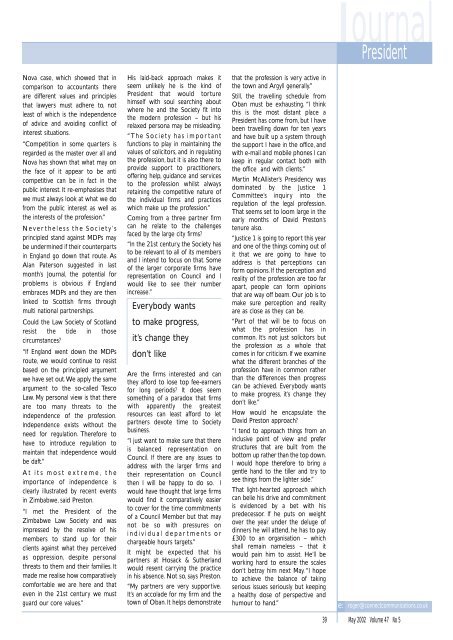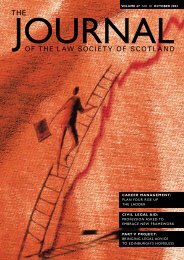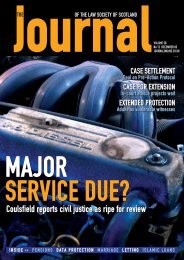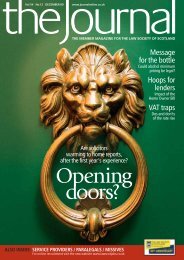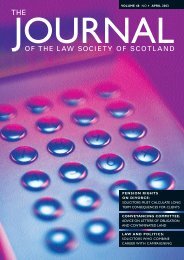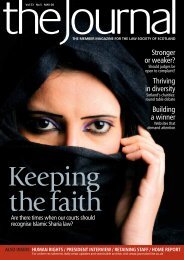OF THE LAW SOCIETY OF SCOTLAND - The Journal Online
OF THE LAW SOCIETY OF SCOTLAND - The Journal Online
OF THE LAW SOCIETY OF SCOTLAND - The Journal Online
Create successful ePaper yourself
Turn your PDF publications into a flip-book with our unique Google optimized e-Paper software.
Nova case, which showed that in<br />
comparison to accountants there<br />
are different values and principles<br />
that lawyers must adhere to, not<br />
least of which is the independence<br />
of advice and avoiding conflict of<br />
interest situations.<br />
“Competition in some quarters is<br />
regarded as the master over all and<br />
Nova has shown that what may on<br />
the face of it appear to be anti<br />
competitive can be in fact in the<br />
public interest. It re-emphasises that<br />
we must always look at what we do<br />
from the public interest as well as<br />
the interests of the profession.”<br />
Nevertheless the Society’s<br />
principled stand against MDPs may<br />
be undermined if their counterparts<br />
in England go down that route. As<br />
Alan Paterson suggested in last<br />
month’s <strong>Journal</strong>, the potential for<br />
problems is obvious if England<br />
embraces MDPs and they are then<br />
linked to Scottish firms through<br />
multi national partnerships.<br />
Could the Law Society of Scotland<br />
resist the tide in those<br />
circumstances?<br />
“If England went down the MDPs<br />
route, we would continue to resist<br />
based on the principled argument<br />
we have set out.We apply the same<br />
argument to the so-called Tesco<br />
Law. My personal view is that there<br />
are too many threats to the<br />
independence of the profession.<br />
Independence exists without the<br />
need for regulation. <strong>The</strong>refore to<br />
have to introduce regulation to<br />
maintain that independence would<br />
be daft.”<br />
At its most extreme, the<br />
importance of independence is<br />
clearly illustrated by recent events<br />
in Zimbabwe, said Preston.<br />
“I met the President of the<br />
Zimbabwe Law Society and was<br />
impressed by the resolve of his<br />
members to stand up for their<br />
clients against what they perceived<br />
as oppression, despite personal<br />
threats to them and their families. It<br />
made me realise how comparatively<br />
comfortable we are here and that<br />
even in the 21st century we must<br />
guard our core values.”<br />
His laid-back approach makes it<br />
seem unlikely he is the kind of<br />
President that would torture<br />
himself with soul searching about<br />
where he and the Society fit into<br />
the modern profession – but his<br />
relaxed persona may be misleading.<br />
“<strong>The</strong> Society has important<br />
functions to play in maintaining the<br />
values of solicitors, and in regulating<br />
the profession, but it is also there to<br />
provide support to practitioners,<br />
offering help, guidance and services<br />
to the profession whilst always<br />
retaining the competitive nature of<br />
the individual firms and practices<br />
which make up the profession.”<br />
Coming from a three partner firm<br />
can he relate to the challenges<br />
faced by the large city firms?<br />
“In the 21st century, the Society has<br />
to be relevant to all of its members<br />
and I intend to focus on that. Some<br />
of the larger corporate firms have<br />
representation on Council and I<br />
would like to see their number<br />
increase.”<br />
Everybody wants<br />
to make progress,<br />
it’s change they<br />
don’t like<br />
Are the firms interested and can<br />
they afford to lose top fee-earners<br />
for long periods? It does seem<br />
something of a paradox that firms<br />
with apparently the greatest<br />
resources can least afford to let<br />
partners devote time to Society<br />
business.<br />
“I just want to make sure that there<br />
is balanced representation on<br />
Council. If there are any issues to<br />
address with the larger firms and<br />
their representation on Council<br />
then I will be happy to do so. I<br />
would have thought that large firms<br />
would find it comparatively easier<br />
to cover for the time commitments<br />
of a Council Member but that may<br />
not be so with pressures on<br />
individual departments or<br />
chargeable hours targets.”<br />
It might be expected that his<br />
partners at Hosack & Sutherland<br />
would resent carrying the practice<br />
in his absence. Not so, says Preston.<br />
“My partners are very supportive.<br />
It’s an accolade for my firm and the<br />
town of Oban. It helps demonstrate<br />
that the profession is very active in<br />
the town and Argyll generally.”<br />
Still, the travelling schedule from<br />
Oban must be exhausting. “I think<br />
this is the most distant place a<br />
President has come from, but I have<br />
been travelling down for ten years<br />
and have built up a system through<br />
the support I have in the office, and<br />
with e-mail and mobile phones I can<br />
keep in regular contact both with<br />
the office and with clients.”<br />
Martin McAllister’s Presidency was<br />
dominated by the Justice 1<br />
Committee’s inquiry into the<br />
regulation of the legal profession.<br />
That seems set to loom large in the<br />
early months of David Preston’s<br />
tenure also.<br />
“Justice 1 is going to report this year<br />
and one of the things coming out of<br />
it that we are going to have to<br />
address is that perceptions can<br />
form opinions. If the perception and<br />
reality of the profession are too far<br />
apart, people can form opinions<br />
that are way off beam. Our job is to<br />
make sure perception and reality<br />
are as close as they can be.<br />
“Part of that will be to focus on<br />
what the profession has in<br />
common. It’s not just solicitors but<br />
the profession as a whole that<br />
comes in for criticism. If we examine<br />
what the different branches of the<br />
profession have in common rather<br />
than the differences then progress<br />
can be achieved. Everybody wants<br />
to make progress, it’s change they<br />
don’t like.”<br />
How would he encapsulate the<br />
David Preston approach?<br />
“I tend to approach things from an<br />
inclusive point of view and prefer<br />
structures that are built from the<br />
bottom up rather than the top down.<br />
I would hope therefore to bring a<br />
gentle hand to the tiller and try to<br />
see things from the lighter side.”<br />
That light-hearted approach which<br />
can belie his drive and commitment<br />
is evidenced by a bet with his<br />
predecessor. If he puts on weight<br />
over the year under the deluge of<br />
dinners he will attend, he has to pay<br />
£300 to an organisation – which<br />
shall remain nameless – that it<br />
would pain him to assist. He’ll be<br />
working hard to ensure the scales<br />
don’t betray him next May. “I hope<br />
to achieve the balance of taking<br />
serious issues seriously but keeping<br />
a healthy dose of perspective and<br />
humour to hand.”<br />
<strong>Journal</strong><br />
President<br />
e:<br />
roger@connectcommunications.co.uk<br />
39 May 2002 Volume 47 No 5


